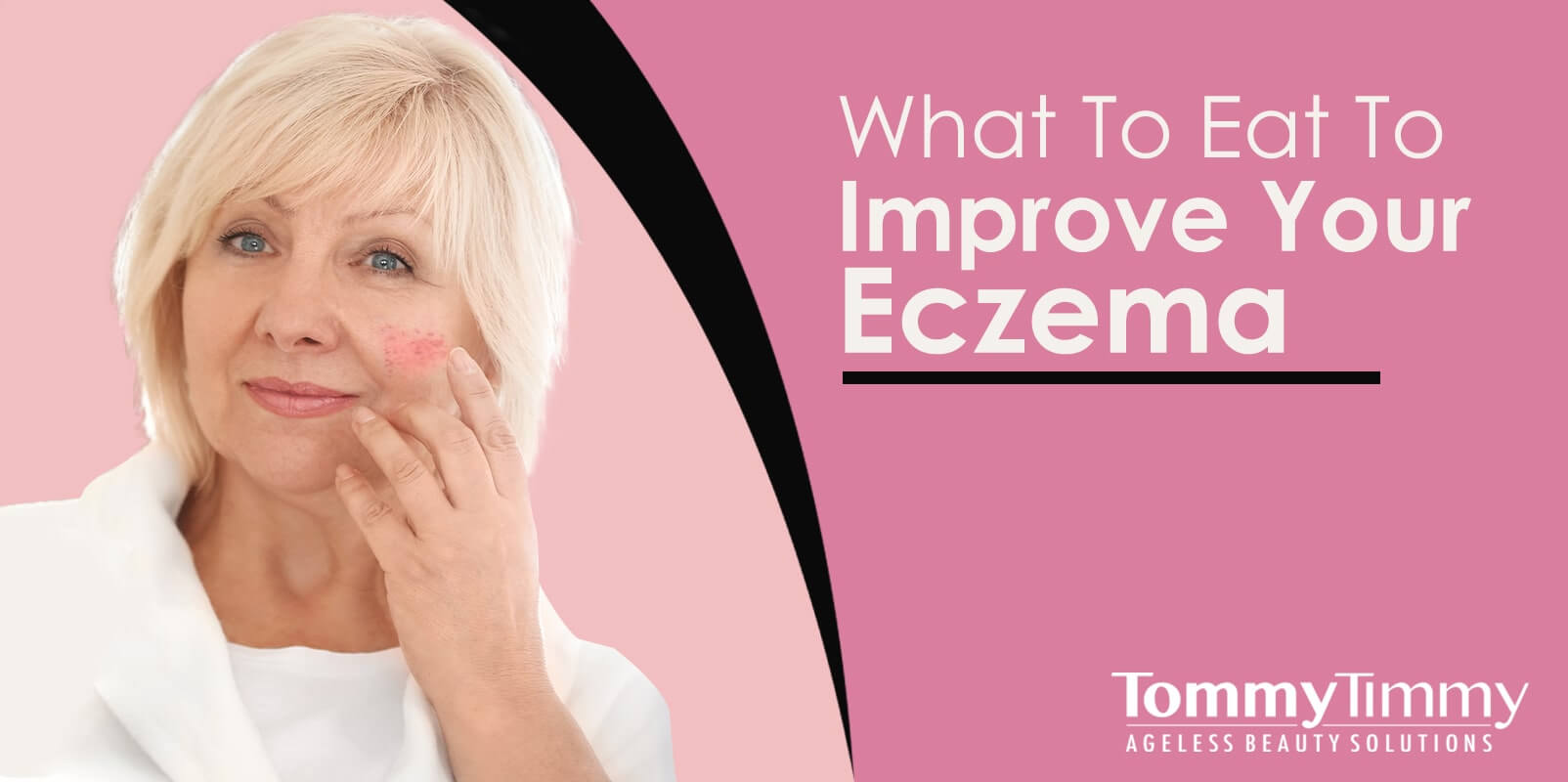Living with eczema can be miserable if proper precautions aren’t implemented. Bathing habits, clothing, scratching, house cleanliness – all of these are factors that can increase or reduce eczema outbreaks. But for many, the main factor that is causing eczema is what you are eating.
From a young age, babies breastfed by mothers who take probiotics and avoid drinking cow’s milk have a lower chance of developing eczema.
Adults can also reduce the frequency of itchy red rashes on their skin by limiting the consumption of inflammatory foods, taking allergens off their meals, and following a diet that suits their needs without sacrificing vital vitamins or nutrients.
Anti-inflammatory Foods Reduce Eczema Symptoms
Eczema is an inflammatory condition, so it makes sense that eating anti-inflammatories will bring balance to your skin.
Omega-3 fatty acids have excellent anti-inflammatory capabilities. You should try and consume at least 250 mg every day from:
- fatty fish like salmon and herring
- green leafy vegetables
- linseed oil
- walnuts
- supplements
Probiotics
Probiotic foods and drinks like yogurt, miso soup, and sauerkraut can balance the gut’s bacteria and, by extension, fight off inflammation from the inside out.
Flavanoids
Apples, spinach, cherries, and other colorful fruits and vegetables have a high concentration of flavonoids that help reduce inflammation throughout the body.
It’s vital to cut on the consumption of trans and saturated fats found in hydrogenated oils and red meats. Fats can also be found in milk, eggs, and other foods that release the T cells that cause inflammation.
Eczema diet plans
There is a connection between eating certain foods and eczema flares. As a result, several eczema diets advise how to reduce symptoms by eating healthily.
The Mediterranean diet, for example, emphasizes eating fruits, green vegetables, red wine, fish, and healthy fats like olive oil. This diet is rich in antioxidants but low in the saturated fatty acids, which are behind inflammation.
The anti-inflammatory diet, on the other hand, eliminates inflammatory and processed foods, emphasizing eating fruits, whole grains, vegetables, fish, and healthy fats.
It’s important to remember that these diet plans aren’t one-size-fits-all, so you may need a diet that is more personalized to your needs.
Eliminate allergens from your meals
Eczema sufferers with food allergies may or may not benefit from following an elimination diet. This plan involves avoiding foods that trigger allergic reactions, such as milk, soy, wheat, chocolate, gluten, and peanuts.
However, the source of allergic reactions can vary from person to person. In which case, cutting out foods, one at a time, from your diet can help you identify the cause of your flares.
This type of diet is recommended for people with hand or dyshidrotic eczema since they can benefit from avoiding flare-inducing allergens like nickel, cobalt, and Balsam of Peru.
Regardless of which type of eczema you have, you should consult with a nutritional therapist who can suggest alternative food sources so you won’t be missing out on any essential vitamins and nutrients.
Stop Eating Gluten
Some studies point to a link between eczema and celiac disease. Whether that’s the case or not, both conditions seem to share gluten-sensitivity as one of their symptoms. So you may see improvements in your skin if you remove gluten from your diet.
Luckily, gluten replacement has gained popularity in recent years. So there are many healthy and tasty gluten-free alternatives to bread, pasta, and other wheat, rye, or barley-based products.
A third way between elimination and eating gluten-free products involves rotating gluten foods in and out of your menu every four to five days. This is a good middle point since it helps you keep a varied diet, stops it from getting boring and repetitive, and may also improve your symptoms.
If you’ve been diagnosed with celiac disease and also have eczema, you may find that some of your eczema symptoms with be resolved by following a gluten-free diet.
Eat healthy white and red meats
We have already mentioned the benefits of fatty fish, but no eczema diet would be complete without a moderate amount of chicken and red meats.
Protein keeps your skin, brain cells, and muscles functioning; without adequate amounts, your body could start swelling, your immune system could crash, and your skin rashes would worsen and become more frequent.
When buying meat, it’s important to choose animals raised using free-range methods to avoid the presence of harmful hormones or toxins. Only the freshest cuts should be used, and all the fatty pieces should be cut off before cooking it.
Finally, any bones left can be used to prepare a nutritious beef or chicken broth, which is incredibly rich in glycine — a skin-repairing amino acid.
Use supplements to complement your diet
Although it is recommended to get all your vitamins, minerals, and nutrients from food, sometimes this isn’t possible. Supplements are a useful alternative if you don’t have time to cook or can’t overeat a certain food because it would increase your flare-ups. Some vital vitamins and minerals which are particularly relevant for eczema include vitamin D, C, E, B6, flavonoids, zinc sulfate, selenium, and probiotic bacteria. Most of these can be found in multivitamins, but it’s recommended you talk to your dermatologist and nutritionist beforehand so you can get a prescription tailored just for you.
The best advice you can follow is to stay away from anything which triggers your flares. You should keep in touch with both a nutritionist and a dermatologist to make sure your eating habits are helping instead of hindering you.
Eat plenty of fresh fruits and vegetables, lean proteins, and stay away from inflammatory foods and other allergens, and you should see improvements in your skin condition.
National Eczema Association
If you have any further questions about eczema or want advice about therapies for eczema then you should be in contact with the National Eczema Association.

